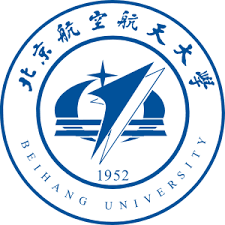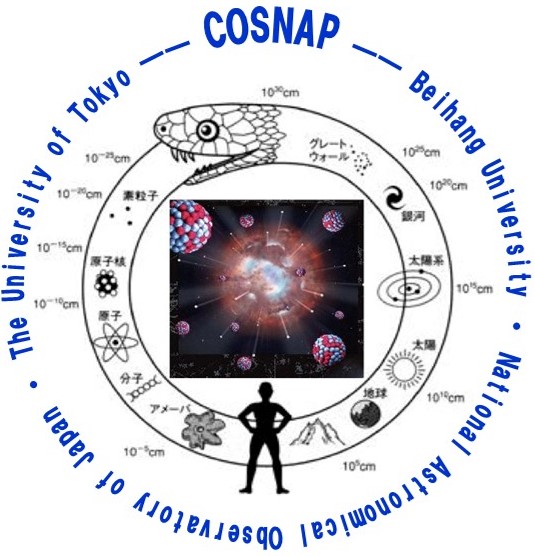INAC International School & OMEG2024 Pre-Symposium
6th floor meeting room
Peng Huanwu Collaborative Center for Research and Education, BUAA
The INAC International School and Pre-Symposium of the 17th International Symposium on the Origin of Matter and Evolution of Galaxies (OMEG2024) will be held at Beihang University (BUAA) in Beijing, China, from September 2 to 6, 2024, one week before the OMEG2024 symposium in Chengdu, China (17th OMEG conference).
This meeting is organized by the Local Organizing Committee (LOC) from various Chinese institutions and International research centers worldwide. The program consists of a one-day pre-symposium followed by a four-day school, featuring frontier-level research talks and fostering discussions on advanced topics in nuclear and astrophysics.
The following topics are discussed in the Pre-Symposium:
Big-Bang cosmology, primordial nucleosynthesis and dark matter
Element distribution in the Universe and Galactic evolution
Explosion dynamics and nucleosynthesis in supernovae and neutron star mergers
Stellar evolution and nucleosynthesis
Neutrinos and weak interactions in physics and astrophysics
Notice: We are accepting a few abstracts from participants and young researchers to give talks in the pre-symposium. This is also a good chance to practice presentation skills!
We will also set a zoom: 817 7020 4802. The password will be sent via email.
The INAC International School will offer lectures on the following research topics:
|
Big-Bang cosmology and dark matter Lecturers: Tatsushi Shima (RCNP, Osaka University) |
|
Stellar Evolution and Stellar Modelling Lecturers: Marco Limongi (Osservatorio Astronomico di Roma, INAF) |
|
Supernova Physics and Supernova Simulation Lecturers: Tomoya Takiwaki (National Astronomical Observatory of Japan) |
|
EOS of Dense Nuclear Matter and Neutron Stars and Quark Stars Lecturers: Ang Li (Xiamen University) |
|
Observations, Chemical Abundances in Stars Lecturers:Jianrong Shi (National Astronomical Observatories, CAS) |
|
Nuclear Physics in Astrophysics Lecturers: Jie Meng (Peking University) |
|
Neutrinos Physics in Astrophysics Lecturers: Yufeng Li (Institute of High Energy of Physics, CAS) |
|
Nucleosynthesis in supernovae and neutron star mergers Lecturers: Jordi José (Departament de Física, Universitat Politècnica de Catalunya) |
|
Cosmic Radioactivities & Gamma-ray Observations Lecturers: Roland Diehl (Max Planck Institute) |
Besides lectures, three tools/codes are selected for participants to engage in group activities and develop their projects. We will also provide tutorial lectures and support on each tool:
|
1. FRANEC code (Stellar Evolution)
|
|
2. TALYS code (Nuclear Reactions Simulation)
|
|
3. Pysme & Pymoog (Observation, Spectroscopy analysis)
|
All tutorial lectures will include exercises designed to deepen the understanding of the given codes. To practice these tutorials and solve exercises, we have scheduled 10-15 hours of group activity time. During this time, participants can choose problems from specific topics or explore multiple areas based on their backgrounds. We encourage participants to expand on the given problems and strive for creative outcomes through discussions with their group members. On the final day, we plan to organize a student session where participants can present their results and discuss them with other attendees.
*The group with the best presentation will receive an award!
Venue
6th floor, Peng Huanwu Collaborative Center for Research and Education, Beihang University, Beijing, China
Important Dates
June 3, 2024: Start of Registration
August 25, 2024: End of Registration
September 2, 2024: OMEG2024 Pre-Symposium
September 3-6, 2024: INAC School
*Registration fee: CNY 500. The event includes lunch boxes, a banquet, and coffee breaks. We do not charge any fee if you only attend the pre-symposium (please see Application information for details). We also reserved about 30 rooms at the Wuke Hotel (物科宾馆), hotel fee is 400 CNY/night. Details are noticed in the Trip & Accommodation.
Local Organizing Committee
- Yudong Luo (Peking University): Co-Chair
- Dukjae Jang (Beihang University): Co-Chair
- Soomi Cha (CENS, Institute for Basic Science)
- Soonchul Choi (CENS, Institute for Basic Science)
- Yong-Beom Choi (Pusan National University)
- Ruoyu Fang (University of Notre Dame)
- Zhenyu He (Beihang University)
- Taoyu Jiao (Institute of Modern Physics, Chinese Academy of Sciences)
- Yangming Lin (National Astronomical Observatory, Chinese Academy of Sciences)
- Kanji Mori (National Astronomical Observatory of Japan)
- Xinxu Wang (Beihang University)
- Hong-Liang Yan (National Astronomical Observatory, Chinese Academy of Sciences)
- Xingqun Yao (Beihang University)
Science Organizing Committee
- Toshitaka Kajino (IRCBBC, Beihang University): School Principal
- Weiping Liu (China Institute of Atomic Energy)
- Xiadong Tang (Institute of Modern Physics, Chinese Academy of Sciences)
- Isao Tanihata (Beihang University)
- Sunghoon Tony Ahn (CENS, Institute for Basic Science)
- Haining Li (Chinese Academy of Sciences)
- Lisheng Geng (Beihang University)
- Xiaoyun Le (Beihang University)
- Danyang Pang (Beihang University)
- Chunyan Song (Beihang University)
- Baohua Sun (Beihang University)
- Gaolong Zhang (Beihang University)
- Shisheng Zhang (Beihang University)
- Yu-Jie Zhang (Beihang University)
- Xiaopeng Zhou (Beihang University)
- Lihua Zhu (Beihang University)
- Hiroshi Watanabe (Beihang University)
Host
- Institute for Nuclear Astrophysics of China (INAC)
- Peng Huanwu Collaborative Center for Research and Education and School of Physics, BUAA
- Cosmology and Nuclear Astrophysics (COSNAP)
Sponsor
This event is supported by China Center of Advanced Science and Technology, National Natural Science Foundation of China, and National Key R&D Program of China.
|

|
 |
 |
 |
||
